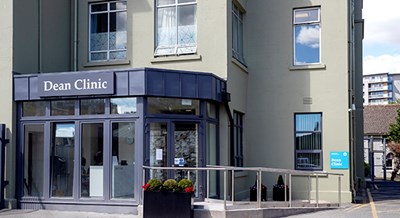Direct Access Day Services are aimed at those who are living with a mental health difficulty and in need of extra support, education and tools and techniques to deal with the mental health concerns unique to them.
Through the Wellness and Recovery Centre at both St Patrick's University Hospital and St Patrick's, Lucan hospitals, we offer a variety of day programme options.
All programmes are undertaken on a group basis and are available for anything from one half day to four half days, for anything from three to twelve weeks, depending on the programme.
Compassion Focused Therapy - Eating Disorder (CFT-E) Group
This is a 25 session closed group which offers a comprehensive psychological therapy for individuals who can manage recovery from their eating disorder in the community. The individuals who will benefit from this intervention tend to share many common problems including being worried about their size, shape, and weight. They are also likely to use food, dieting, activity, vomiting or weight loss drugs to manage difficult experiences, relationships, or painful thoughts, feelings and memories.
The group incorporates psycho-education for both patients and their family members; skill building and therapeutic elements. It aims to target both biological starvation and the underlying psychological processes which underpin and maintain an eating disorder.
Mindfulness
The Mindfulness based approach(MBSR) aims to teach people a set of skills to help practice paying attention moment by moment, in a non-judgmental manner. Mindfulness skills can help us manage daily and on-going difficulties that present, incorporating physical and psychological problems and challenges. We are often on automatic pilot reacting to our experiences on automatic. Mindfulness training helps us become more aware of the present moment and we can then respond mindfully, possibly making more mindful choices.
The approach combines ancient traditions with current knowledge, understanding and research. The Mindfulness based stress reduction (MBSR) course focuses on
empowering people to open up to their experiences, ‘be present’ and cultivate a kinder, more compassionate self. The mindfulness programme runs one morning (St Patricks) or one evening (St Patrick's, Lucan) per week for 8 weeks.
Recovery (WRAP) Programme
The Recovery Programme is designed to assist those with mental health difficulties who struggle with symptoms and want to avoid relapse. The main emphasis of the Recovery Programme is the creation of your own WRAP® (Wellness Recovery Action Plan). It aims to educate each person, allowing them to self-monitor their mental health using their WRAP® Plan and to identify factors that may block or support their Recovery. While WRAP® is delivered as one segment, additional group work sessions on Recovery topics which support WRAP® are also included, e.g: Motivation to change, Self and Relationships, Self-esteem, Building Social Supports and Enhancing general health.
WRAP® is facilitated by accredited advanced level WRAP® facilitators who were trained by the Copeland Centre.
The Recovery Day Programme
The Recovery day Programme is a 12- day programme consisting of 2 days per week over a six week period. The typical hours of this programme is 9.30am - 4.30pm.
The Recovery Evening Programme
The Recovery Evening Programme comprises of one evening a week for eight weeks (Thursday evening 6.00pm - 9.30pm). The Recovery Evening Programme is designed specifically for those who cannot attend the day Recovery Programme due to work or college commitments.
Some of the Direct Access programmes are located in St Patrick's Lucan can include:
Mood Management for Depression
This programme is designed to help those whom have a diagnosis of depression. It consists mainly of a behavioural activation for depression approach, and also incorporates mindfulness practices. The approach usually focuses on difficulties in the here and now.
The aim is to identify and understand problems in terms of relationships between feelings and behaviour using activity diaries and activity scheduling. The focus of this programme with a view to developing personalised goals and coping strategies that can be more useful in the longer term.
This programme provides a gentle introduction to:
Behaviour Activation in a safe environment, where the emphasis is on a participative style of learning with only limited sharing of personal information if participants so wish. This programme will have planned homework and exercises to help realise some of the concepts being introduced, and also materials will be provided for clients to read between sessions.
Roles in Transition
This programme helps us work through changing roles in working or intimate relationships in the context of mental ill health. Every individual has different roles within their lives which make up the whole self; parent, sibling, employee, partner, etc. These roles can evolve throughout our life in the face of life events and journeying through the life cycle.
After a period of mental ill health, it can be important to “review” these roles and introduce changes to maintain our mental health. Also, a change in our roles - separation, bereavement, promotion, redundancy, parenthood, etc can challenge our mental resilience and it can be important to develop new skills to manage this change.
The group aims to:
• Identify the different roles that make up the whole self and the tasks and expectations within those roles.
• Identify the roles or tasks that we want to change or adapt to.
• Explore skills, strategies and obstacles to implement the desired change.
• Recognise the impact this change may have on those around us and the impact their subsequent behaviour has on us.
• Explore ways of dealing with the above.
Acceptance and Commitment Therapy
Acceptance & Commitment Therapy, (ACT) is a form of therapy that helps people learn mindfulness skills. There is also a large emphasis on connecting with values. This means connecting to that which matters the most to us and then helping to align our actions so that they bring us towards where we really want to be. Each week group members will learn new skills to help them deal with difficulties they might experience in their daily lives. One of the key aims of ACT is to help increase our levels of psychological flexibility. When we have greater psychological flexibility it does not mean that we will never feel down or stressed again, but it does help us better deal with challenges and difficulties we may encounter.
How to access a day programme
• St Patricks Mental health Service is independent and not for profit. That means we are not constrained by catchment area.
• Our programmes are covered by health insurance.
• All programmes require a referral form from your GP or mental health team, if attending another mental health service.
Your GP/referrer will forward a referral form to the St Patricks Referral and Assessment service.
What happens once I am referred to take part in a programme?
• The Referral and Assessment administrator will send you a letter to let you know that the referral has been received and who to contact with any queries
• Your insurance eligibility is checked (this takes up to 3 days) and the referral is passed to the programme coordinator.
• Programme costs are covered by most health insurers (except ESB, Garda and Prison Officers’ Scheme). If your insurance cover is not sufficient, the administrator will inform you.
• The programme coordinator will contact you with an appointment for assessment or a start date for the programme. The assessment may be undertaken over the phone.
• Before you start a programme you will register with the Day Service administrator in St Patricks or St Patrick's Lucan.
• The registration process is relatively quick and requires you to sign an electronic pad.
Where can I get more information?
• For details of when and where programmes take place see Direct Access Programes information page.
• Visit the Information Centre which is located in the main reception area of St Patrick’s University Hospital.
Tags: Day programmes


